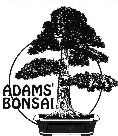It may be hard to believe, but there was a time when Julian Adams did not live in Lynchburg. He did not sell cars from Chrysler from the lot of Adams Motor Company downtown, he did not serve on Lynchburg City Council or as Mayor, and he did not work for economic or civic growth in the city of his birth. Julian Adams was, at one time all that stood between North America and the threats surrounding this hemisphere during the Cold War. Okay – a bit of an exaggeration. However, during a four-year period in the late 1960s, Julian Adams, as an engineer with a Master’s Degree from Stanford, helped to ensure radar installations here and abroad worked correctly. These installations did not detect nuclear missiles, but bombers or jets that could drop devices full of biological agents or conventional bombs. “(The radar) kept an eye out for anything coming our way that we didn’t want to come our way,” Adams explained. “What I did was kind of like hooking up the VCR – I made sure we didn’t see any snow when we turned the radar on.”
It was four years away in what Adams described as “wild and wooly places.” Locations like Goosebay, Labrador in Canada, or the wilderness coasts of Maine, and even six weeks of civilian duty in Vietnam during the height of that conflict. “It was a lot of traveling around, and I got to see a lot of different places,” said Adams. “But, I really couldn’t find one better than Lynchburg.” Adams admits, with the job and credentials he had, he could have ended up in Los Angeles, San Francisco or New York. However, he says, Lynchburg is a city with “staying power.” “Lynchburg doesn’t have the biggest this, or the fanciest that,” Adams said, “but the day-to-day living here is the best.”
And, so, Adams returned to Lynchburg. After all, he was born here, grew up here, can remember a time when the tract of land that became the location for Linkhorne Elementary and Middle Schools was a cow pasture – when Linkhorne Forest was actually a forest. He can remember when the houses were few and far between on the now-busy stretch of road, and when his first vegetable garden was located where the Greek Orthodox Church now is. He came home and, with his wife Mary, raised three children, returning to the family business of selling cars.
There are, according to Adams, a lot more reasons to appreciate Lynchburg than just the fact that he was born here, or that Adams Motor Company, and thus his roots, were here. Adams says Lynchburg offers plenty to do, if you are a doer, and don’t want to just sit and be entertained. “If you like to run and hike, or ride a bike like I do, this is a great place to be,” said Adams. “The parkway is only about 20 minutes away, and the trails here are great.”
It didn’t hurt, Adams said, that the cost of living in Lynchburg was sure a lot better than in the big cities he could’ve chosen to live in. “The folks are friendly, we’ve got a good educational system,” Adams added, “and it’s a great place to raise kids.” Adams even praises the city’s climate, and the region’s four distinct seasons, saying, “we get just enough snow and just enough heat to appreciate it and not hate it, and spring and fall are just wonderful,” he said.
It could be argued that, outside of the car business, Adams is perhaps best known for his time as a member of the Lynchburg City Council. The political splinter of Adams’ life began in 1984 when he was persuaded to finish out the term of a councilman who had died in middle of his four-year term. He was persuaded to run again in 1986, and would seek re-election in 1990. “At that time, the council was so involved in the day-to-day issues, like which pothole got fixed and which tree needed to be cut down,” said Adams. “I tried to get the council to concentrate on long-range issues and what was next for the city.” Adams says government moves very slowly and often squashes things in its path when it moves at all. “Change should not be done lightly and without thought and planning,” Adams said, “but getting politicians to think long range about education or economic development is tough.”
One of the items Adams asked for and got was a yearly daylong retreat for the members of council. It was, he said, a chance for the councilmen to sit down together, have a good lunch and talk about what needs the city needed to meet in the long run. Adams said at first the press was openly hostile towards the idea of a retreat, and openly investigated whether the council was wasting taxpayers’ money on large meals and drinks, not really trying to accomplish much at all. In the end, he said, when they couldn’t find anything dastardly or corrupt going on at the retreat, even the press had to admit the get-away was a good thing for the council members and for the city. “We worked hard on the issues of education and economic development,” said Adams. “A lot of the good things were accomplished during that time on council were started at one of those retreats.”


A Civic Life
By Eric Powers
page 1

